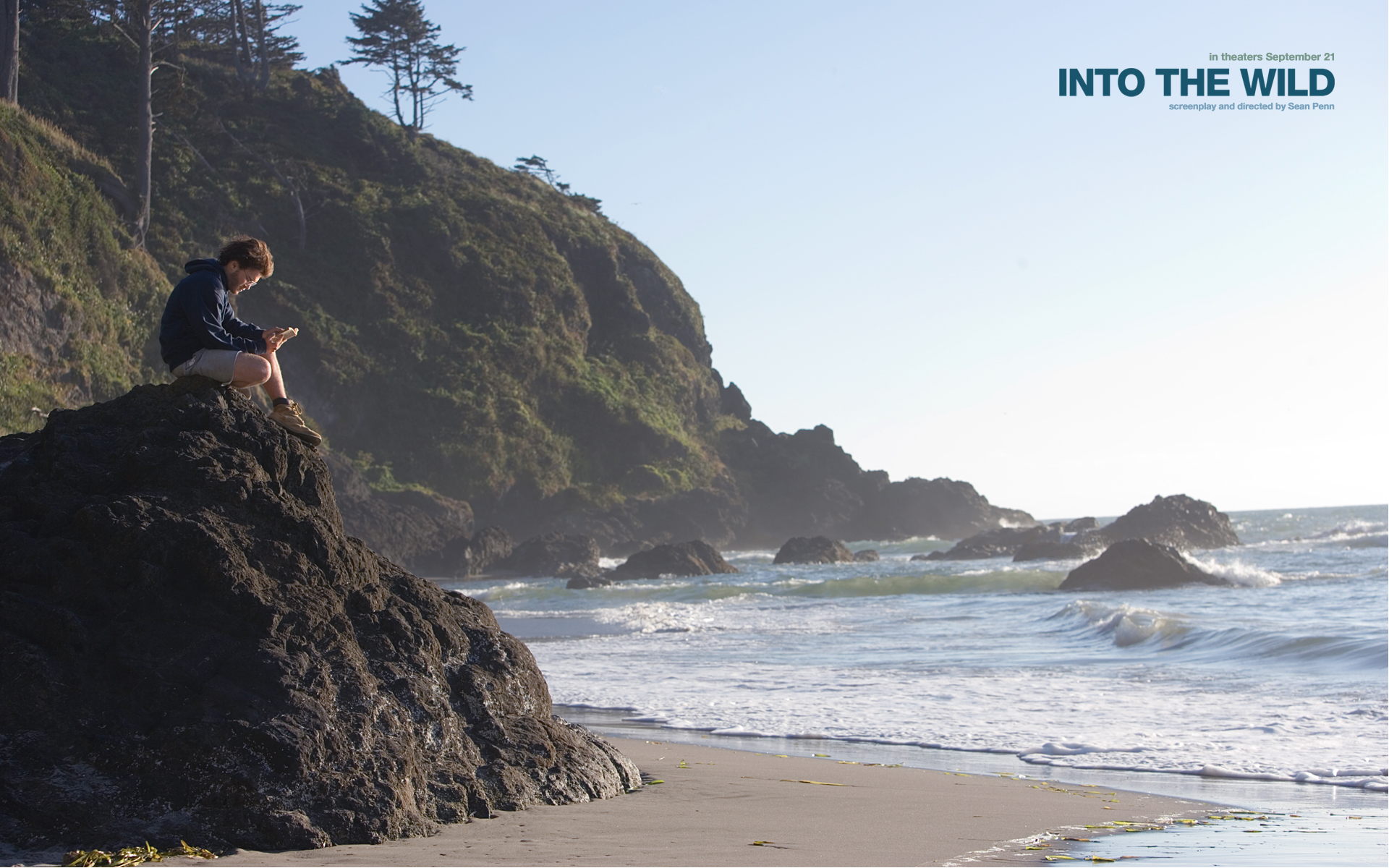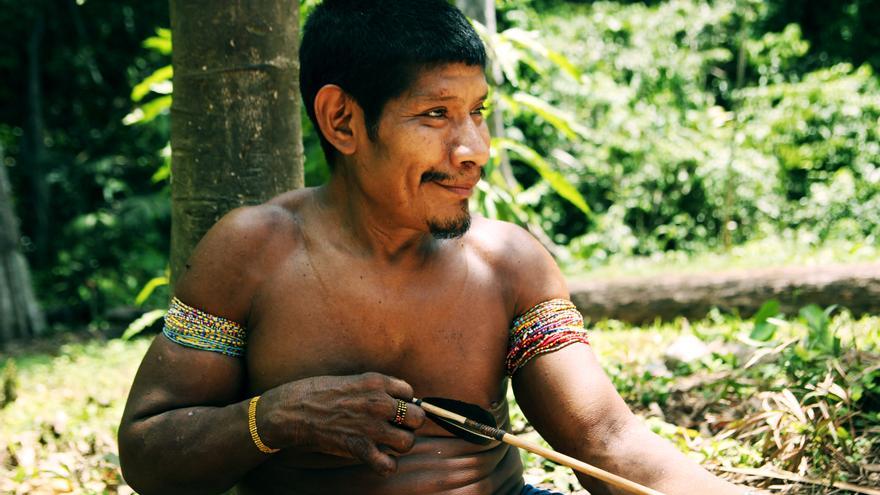 |
| Chris McCandless/Alexander Supertramp reading in the film Into The Wild by Sean Penn. |
 |
| A member of the Awá tribe in Brazil, one of the most endangered tribes in the world. |
The myth of the good/noble savage (romantic primitivism) is a concept first introduced by the french philosopher Jean Jaques Rousseau. This myth is based around the concept of the noble/good savage, stock character/stereotyped character which embodies and idealized indigene, outsider. This character hasn't been corrupted by civilisation, so he embodies human's innate goodness. Of course, by savage Rousseau meant a wild person: it doesn't have the negative connotation that this word has nowadays.
This "wild person" would then live in Nature among the other animals, as another inhabitant of this place. So this person would take part in this ecosystem, without endangering this balance and even being necessary for it.
By living in Nature, this "noble savage" would feed from animals he hunt, without any machines or any tool made by modern civilisation, living with his little peaceful and "pure" community, as opposed to civilisation.
So at the end, the good/noble savage is part of Mother Nature and, as he is not corrupted by civilisation, he embodies the innate goodness the human has within himself.
But John Dryden, and english poet, literary critic, translator and playwright, was the one to introduce the expression "noble savage" into english literature, in this case simply meaning the beast that is above the other beasts, or man.
In the film Into The Wild, the main character, Chris McCandless/Alexander Supertramp, thinks about civilisation, society, as something full of hatred and evil, that corrupts people. As opposed to this society, Chris thinks that Nature is a place that is pure, a place that can heal and kill the corruption people get from living in a "civilized society". This is the same idea as romantic primitivism, where civilisation represents the new evil that is corrupting the human race, as opposed to Nature, the embodiment of the innate and original goodness of the human being. And we clearly see that Chris has this idea in mind throughout the film as he is trying to be a good/noble savage, even if he comes from a civilised society. So he is not a noble savage, but he wants to go back to his "wild" roots and human race's origins, to become one again.
At the end, Chris is longing to become pure again, but in order to achieve this, he will have to have a "climactic battle to kill the false being within", his new self, that has been corrupted by civilisation. And to become his "old" and "original" self again, he will go to Alaska, to cut his connections with the society that corrupts him and be closer to Nature, from which he will get the antidote to this new evil that lives within himself.
Sadly, Chris fails to grasp that living in nature is extremely hard, as getting food is very difficult. Also the weather can get him killed, and mostly the cold. We see this from the beginning, where the man who drove him to Alaska's wilderness gives him boots, as he doesn't have some, also he fails to keep the moose's meat in good condition, after hunting it. So we see that he is not well prepared and that he is not really aware of the difficulty of living in the wild. Mostly, one of the truths about Nature that Chris fails to grasp is that his humanity could get him killed, in fact, he is not letting his "wild side"/survival instinct come off, which is extremely important, because in Nature, it's kill or be killed (a.k.a. the law of the jungle). We see this after finding the "magic bus", when he retracts from killing a little moose. Of course this is not done, even among hunters, but when your life is at stake, you don't really have an option.
After all this, one question could be asked: is really Chris a noble savage, or only a romantic. Well, to answer this, we have to know what the differences are between these two. So, first of all, a noble savage is someone that lives in Nature, someone that is pure, and not corrupted by society, this meaning that he is the allegory of man's original goodness. On the other hand, a romantic is someone that wants to be a noble savage, meaning he has the same ideals of a noble savage, so a romantic is idealistic. By knowing this, it is quite clear that Chris is a romantic, in fact, even if he had the same ideals of a noble savage, such as that civilisation is corrupting the people, he fails to grasp what life in Nature really is. He thinks that he can live in Nature without needing to bring out his wild side. He also wants to be a noble savage (being pure again, etc), so he isn't one yet. Finally, he wants to be one with Nature again, to become pure, but when finding the "magic bus", he doesn't reject that opportunity. So he still is way too rooted to material conforts and amenities that civilisation gave him: he can't live in Nature, because this requires him to reject everything about civilisation.
So, at the end, after living in society, it is not really possible to get back to a state of nature, because man needs society to survive, in fact we don't have all the tools animals have to survive, such as claws, fur, etc. So at the end, we cannot live by ourselves in Nature without the amenities society gave us. This is even seen in "primitive societies", where people survive with weapons they made and mostly thanks to the help more humans give us. So we can always try to live in Nature by ourselves, but the result we always will get from doing this is death, would it be caused by another animals, lack of food, bad weather conditions, accidents, humankind's physical fragility (we can easily brake our bones, etc) or even suicide due to loneliness, in fact, as someone one said: "to feel the pain of loneliness, is to feel death's embrace".
Sadly, Chris fails to grasp that living in nature is extremely hard, as getting food is very difficult. Also the weather can get him killed, and mostly the cold. We see this from the beginning, where the man who drove him to Alaska's wilderness gives him boots, as he doesn't have some, also he fails to keep the moose's meat in good condition, after hunting it. So we see that he is not well prepared and that he is not really aware of the difficulty of living in the wild. Mostly, one of the truths about Nature that Chris fails to grasp is that his humanity could get him killed, in fact, he is not letting his "wild side"/survival instinct come off, which is extremely important, because in Nature, it's kill or be killed (a.k.a. the law of the jungle). We see this after finding the "magic bus", when he retracts from killing a little moose. Of course this is not done, even among hunters, but when your life is at stake, you don't really have an option.
After all this, one question could be asked: is really Chris a noble savage, or only a romantic. Well, to answer this, we have to know what the differences are between these two. So, first of all, a noble savage is someone that lives in Nature, someone that is pure, and not corrupted by society, this meaning that he is the allegory of man's original goodness. On the other hand, a romantic is someone that wants to be a noble savage, meaning he has the same ideals of a noble savage, so a romantic is idealistic. By knowing this, it is quite clear that Chris is a romantic, in fact, even if he had the same ideals of a noble savage, such as that civilisation is corrupting the people, he fails to grasp what life in Nature really is. He thinks that he can live in Nature without needing to bring out his wild side. He also wants to be a noble savage (being pure again, etc), so he isn't one yet. Finally, he wants to be one with Nature again, to become pure, but when finding the "magic bus", he doesn't reject that opportunity. So he still is way too rooted to material conforts and amenities that civilisation gave him: he can't live in Nature, because this requires him to reject everything about civilisation.
So, at the end, after living in society, it is not really possible to get back to a state of nature, because man needs society to survive, in fact we don't have all the tools animals have to survive, such as claws, fur, etc. So at the end, we cannot live by ourselves in Nature without the amenities society gave us. This is even seen in "primitive societies", where people survive with weapons they made and mostly thanks to the help more humans give us. So we can always try to live in Nature by ourselves, but the result we always will get from doing this is death, would it be caused by another animals, lack of food, bad weather conditions, accidents, humankind's physical fragility (we can easily brake our bones, etc) or even suicide due to loneliness, in fact, as someone one said: "to feel the pain of loneliness, is to feel death's embrace".